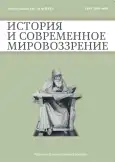Малороссийская старшина до и после Северной войны: семья Максимовичей на фоне эпохи
- Авторы: Лукашова С.С.1
-
Учреждения:
- Институт славяноведения Российской академии наук
- Выпуск: Том 4, № 4 (2022)
- Страницы: 33-37
- Раздел: Статьи
- URL: https://bakhtiniada.ru/2658-4654/article/view/147269
- DOI: https://doi.org/10.33693/2658-4654-2022-4-4-33-37
- ID: 147269
Цитировать
Аннотация
Ключевые слова
Полный текст
Открыть статью на сайте журналаОб авторах
Светлана Станиславовна Лукашова
Институт славяноведения Российской академии наук
Email: bractwo@yandex.ru
кандидат исторических наук, Старший научный сотрудник Отдела восточного славянства Москва, Российская Федерация
Список литературы
- Алмазов А. С. Политический портрет украинского гетмана Ивана Самойловича в контексте русско-украинских отношений (1672-1687 г.). М.: Издательство Румянцевского Музея, 2012. - 285 с.
- Андреев А. А. «Пребываю верным слугою вам моему государю, князь Александр Черкасский». СПб.: Наука, 2020. - 239 с.
- Васильев Д. В. Рождение империи. Юго-восток России: XVIII - первая половина XIX в. СПб.: Дмитрий Буланин, 2020. - 606 с.
- Кидирниязов Д. С. Ногайцы - офицеры российской армии (XVI - начало XX в.) // Проблема социально-политического развития народов Северного Кавказа в последней трети XIX - начале XX веков. Материалы Всероссийской научно-практической конференции, посвященной 100-летию Первой мировой войны / Отв. Ред. Х.А. Хизриев. Махачкала, 2014. С. 118-126.
- Костомаров Н. И. Мазепинцы // Костомаров Н.И. Собрание сочинений. Исторические монографии и исследования. 8 кн. СПб., 1903-1906. Кн.6, т. XVI. 1905. - 815 c.
- Кочегаров К. А. Русское правительство и семья украинского гетмана Ивана Самойловича в 1681-1687 гг. М.: Ин-т славяноведения, 2012. - 221 с.
- Кривошея В. В. Генеалогія українського козацтва. Нариси історії козацьких полків. Київ: Стилос, 2004. - 389 с.
- Кривошея В. В. Неурядова старшина Гетьманщини. Київ: Стилос, 2009. - 431 с.
- Кривошея В. В. Козацька старшина Гетьманщини. Енциклопедія. Київ: Стилос, 2010. - 792 с.
- Лазарев Я. А. «Глаза и руки ли государевы?» Роль резидентов при гетманском дворе в контексте российско-украинских отношений в 10-е гг. XVIII в. // Исторический вестник. 2013. Т. 6, № 153. С. 82-111.
- Модзалевский В. Л. Малороссийский родословник. Киев, 1908-1914. Т. 3, 1912. Л-О.
- Озова Ф. А. Институт аманатства в кавказской политике Петра I // Ученые записки Казанского университета. Серия: Гуманитарные науки. 2015. Т. 157, № 3. С. 220-229.
- Павленко С. Оточення гетьмана Мазепи. Соратники та прибічники. Київ: Києво-Могилянська академія, 2004.- 602 с.
- Таирова-Яковлева Т. Г. Мазепа. М.: Молодая гвардия, 2007. - 271 с.
- [Хижняк З.І.] Києво-Могилянська академія в іменах, XVII - XVIII ст.: Енцикл. вид. / Упоряд. З.І. Хижняк; за ред. В.С. Брюховецького. Київ: Києво-Могилянська академія, 2001. - 736 с.
Дополнительные файлы








